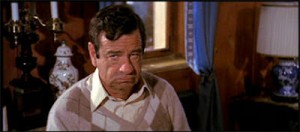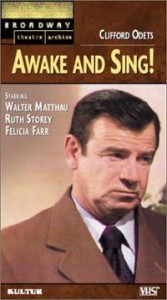 I’ve been thinking about Walter Matthau, one of my all-time favorite movie stars and among the very few character actors—Edward G. Robinson was another—who managed to become an above-the-title leading man in spite of the fact that he wasn’t conventionally attractive. I once considered writing a lengthy essay about Matthau, but his offstage life was insufficiently interesting or eventful (he was a near-degenerate gambler who liked classical music and spent most of his time making movies) to justify extended treatment. Moreover, I soon realized that I’d already written that piece, more or less, when I wrote about Robert Mitchum for Commentary.
I’ve been thinking about Walter Matthau, one of my all-time favorite movie stars and among the very few character actors—Edward G. Robinson was another—who managed to become an above-the-title leading man in spite of the fact that he wasn’t conventionally attractive. I once considered writing a lengthy essay about Matthau, but his offstage life was insufficiently interesting or eventful (he was a near-degenerate gambler who liked classical music and spent most of his time making movies) to justify extended treatment. Moreover, I soon realized that I’d already written that piece, more or less, when I wrote about Robert Mitchum for Commentary.
Like Mitchum, Matthau was the quintessential example of a greatly gifted artist who didn’t take his art seriously enough to challenge himself. He played leading roles in a dozen Broadway plays, virtually all of which were flops, before finally hitting the jackpot in 1965 with Neil Simon’s The Odd Couple. After that, he never again appeared on the New York stage, preferring to make vast amounts of money in Hollywood, most of which he gambled away. Nor did he ever make a film remotely as distinguished as Charles Laughton’s The Night of the Hunter, which left no possible doubt of Robert Mitchum’s ability to grapple with uncompromisingly serious material. “Listen, for twenty-five years I’ve been a serious actor,” Matthau had told Mike Nichols at an Odd Couple rehearsal. “Now, I want to be a popular actor.” So he spent the rest of his life making genre films of various kinds, and though a few of them, including Charley Varrick, Hopscotch, House Calls, I.Q., A New Leaf, The Taking of Pelham One Two Three, and (of course) the screen version of The Odd Couple, are memorable, most were instantaneously forgettable.
On three widely separated occasions, Matthau appeared in TV versions of major plays, Clifford Odets’ Awake and Sing!, Sean O’Casey’s Juno and the Paycock, and Othello, in which he played Iago, his only Shakespearean role. Toward the end of his life, he singled out the last of these appearances as the highlight of his career: “Most of my work is crap, I’m waiting for something good. I did a good thing in 1952, on the Philco Playhouse. I played Iago. That I liked.” But while he talked at odd intervals about returning to the stage—he actually claimed to have given some thought to trying his hand at Lear—he only followed through once, doing Juno in Los Angeles in 1974. From then on he usually settled for throwaway films like The Odd Couple II.
 Every artist has a right to be judged by his best work, and by that standard Matthau still has a strong claim on the attention of anybody who cares about good acting. He was an immensely charismatic and knowing craftsman with a much wider range than is commonly acknowledged, and his nasal, gravelly whine and basset-hound face always added value to the drossiest of the films in which he starred. Yet I can’t help but recall what David Thomson wrote about him in his Biographical Dictionary of Film: “There’s something sad in that Matthau’s occasional appearances on talk shows—poker-faced, piss-eloquent, a collection of anecdotes and disguises—were invariably more interesting than his pictures.”
Every artist has a right to be judged by his best work, and by that standard Matthau still has a strong claim on the attention of anybody who cares about good acting. He was an immensely charismatic and knowing craftsman with a much wider range than is commonly acknowledged, and his nasal, gravelly whine and basset-hound face always added value to the drossiest of the films in which he starred. Yet I can’t help but recall what David Thomson wrote about him in his Biographical Dictionary of Film: “There’s something sad in that Matthau’s occasional appearances on talk shows—poker-faced, piss-eloquent, a collection of anecdotes and disguises—were invariably more interesting than his pictures.”
Even more to the point is a conversation that John Williams, the Star Wars man, once reported having had with Bernard Herrmann:
He was never flattering, but he encouraged me. In the early sixties I wanted to write a symphony. One day at lunch I complained to Benny about wanting to write some music other than film music. He answered, “Who’s STOPPING ya?” His answer was so blatant and direct—and right—that I went home and spent the requisite four or five months writing this piece.
That, I fear, must be Walter Matthau’s epitaph: he stopped himself from trying harder. Or, as he confessed to a journalist who interviewed him while he was taping Awake and Sing!, “It’s too easy being a movie actor. Spoils you for other things.” And so it did.


